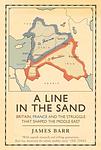The Greatest "Middle East, Political" Books of All Time
Click to learn how this list is calculated.
This list represents a comprehensive and trusted collection of the greatest books. Developed through a specialized algorithm, it brings together 300 'best of' book lists to form a definitive guide to the world's most acclaimed books. For those interested in how these books are chosen, additional details can be found on the rankings page.
Genres
The "Political" category of books encompasses works that explore the theory, practice, and history of government and politics. These books may cover topics such as political ideologies, political systems, political institutions, political movements, and political leaders. They may also examine the relationship between politics and other areas of society, such as economics, culture, and international relations. Political books can be both informative and thought-provoking, offering readers insights into the complexities of the political world and the challenges of governing in a democratic society.
Countries
Date Range
Reading Statistics
Click the button below to see how many of these books you've read!
Download
If you're interested in downloading this list as a CSV file for use in a spreadsheet application, you can easily do so by clicking the button below. Please note that to ensure a manageable file size and faster download, the CSV will include details for only the first 500 books.
Download-
1. Orientalism by Edward W. Said
This book is a critical examination of Western attitudes towards the East, particularly the Middle East, and how these attitudes have shaped and continue to shape Western policies and perceptions. The author argues that the West has a long history of viewing the East as the "other," exotic and inferior, and that this view has been institutionalized through academic disciplines, literature, and media. This "Orientalism," as the author calls it, has served to justify colonialism and imperialism, and continues to influence Western attitudes and policies towards the East today.
-
2. The Prize: The Epic Quest for Oil, Money, and Power by Daniel Yergin
"The Prize: The Epic Quest for Oil, Money, and Power" is a comprehensive history of the global oil industry, tracing its development from the drilling of the first well in Pennsylvania to the oil crisis of the 1970s and its aftermath. The book examines the key players, political conflicts, and technological advancements that have shaped the industry, and explores the profound impact of oil on the global economy and geopolitics. It also discusses the environmental and social challenges associated with oil production and consumption.
-
3. The Vanished Imam by Fouad Ajami
"The Vanished Imam" delves into the life and legacy of Musa al Sadr, a charismatic Lebanese Shia cleric who mysteriously disappeared in 1978. The book explores his influential role in the transformation of the Shia community in Lebanon from a marginalized group to a significant political force. Through a detailed narrative, the author examines al Sadr's efforts to empower the Shia, his establishment of the Amal Movement, and his disappearance during a trip to Libya, which remains a contentious issue in the Middle East. The book also provides a broader analysis of the social and political dynamics of Lebanon and the region, highlighting the complexities of identity and power.
-
4. A Peace To End All Peace by David Fromkin
The book provides a detailed historical analysis of the Middle East from the onset of the First World War through to the early 1920s, focusing on how the decisions and actions of European powers, particularly Britain, led to the dismantling of the Ottoman Empire and the arbitrary redrawing of borders. It explores the diplomatic intrigues, strategic considerations, and often conflicting interests that shaped the modern Middle East, leading to a legacy of turmoil and conflict. The narrative critically examines the consequences of foreign intervention and the imposition of artificial state boundaries, shedding light on the origins of many of the region's ongoing struggles.
-
5. A Line In The Sand by James Barr
This book delves into the complex history of the modern Middle East, focusing on the post-World War I era when Britain and France drew arbitrary borders, creating new nations and sowing the seeds for future conflicts. It examines the clandestine struggle between these colonial powers as they vied for dominance in the region, often at the expense of the local populations. The narrative reveals how the duplicitous actions and broken promises of Western powers during this period set the stage for enduring turmoil and established a legacy of distrust and instability that continues to affect the geopolitics of the Middle East to this day.
Reading Statistics
Click the button below to see how many of these books you've read!
Download
If you're interested in downloading this list as a CSV file for use in a spreadsheet application, you can easily do so by clicking the button below. Please note that to ensure a manageable file size and faster download, the CSV will include details for only the first 500 books.
Download



